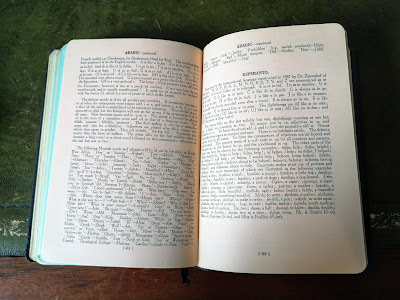Some time ago, back in March, I bought this cute little 'universal phrasebook' in the massive second hand bookshop in Rochester.
As you can see, it covers 25 European languages (not all, and not only), and each section has the same phrase given in each language across a double page spread. So I can tell you that luggage is les bagages, il bagaglio, el equipaje, a bagagem, and bagajul in French, Italian, Spanish, Portuguese and Romanian (Rumanian, in this book, as it's old) just by running a finger across one of the pages.
Like me, you might have spotted the anomaly that is Esperanto (an invented language, unlike the others), and being a language nerd I immediately turned to the grammatical description of the language that's helpfully provided at the start of each section (for languages associated with a particular country, it also has useful traveller advice such as what side of the road to drive on and how to address letters).
There, it informed me that the language has suffixation to indicate many meanings, including -ino for feminine, and -ido for juvenile - I inferred this from the examples:
hundo - a dog
hundino - a bitch
hundido - a puppy
There's ones for big and small and many and so on:
hundeto - a little dog
hundego - a big dog
hundaro - a pack of dogs
And even one for a kennel, hundujo. Being a language nerd, I was of course immediately infuriated: nowhere does it tell me how to say 'a young female dog'. Is it hundinido or hundidino? Does one indicate gender or age closest to the noun? I just did it in English: gender was closer to the noun, which we normally attribute to it being more 'inherent' (this is a bit of a fuzzy notion sometimes), and I didn't say a female young dog. So if Esperanto follows this rule of more inherent characteristics being closer to the noun, it should be hundinido. But then I found this on a forum which seems to say the opposite:
For instance, if we want to say "a tiny female kitten," we commence with the root kat-, giving the idea only of "cat"; then add -id- (suffix for "offspring of") kat-id- = kitten; then -in- (female suffix) kat-id-in- = kitten, female; then -et- (diminutive suffix) kat-id-in-et- = kitten female tiny; we have now got the root and all of the suffixes, and we might want a noun, so add O, kat-id-in-et-o = a tiny female kitten. If we place -et- after kat-, we commence by speaking of a "tiny cat", for kateto has that meaning, so katetidino would be the "female offspring of a tiny cat." If we reversed the three suffixes, we should get kat-in-et-id-o = offspring of a tiny female cat. This exaggerated example of building up suffixes will show the importance of placing them in their natural order. The student cannot make a mistake if he commences with the root and forms a word of each suffix in succession; for instance, hund-o = a dog, hund-id-o = a puppy, hundid-in-o = a female puppy, hundidin-eg-o = a huge female puppy.
Notice that the English word kitten has the meaning 'offspring' built into it, so there's no way to express this any other way than with that meaning closest to the noun. I think this might be a case of an English-speaking mindset obscuring the alternative options that are logically possible.
But also, it's interesting that katetidino ('cat-small-offspring-female') doesn't apparently mean 'a small female kitten' (katidineto) and that presumably katinideto ('cat-female-offspring-small') would mean 'small offspring of a female cat', as there is no possessive marker in this word. Anyway, all this talk of 'natural order' is very reminiscent of the way that Latin grammarians would talk of the parts of the sentence being in the 'natural order' - which, of course, is only natural if that's what you're used to.
My favourite translation of them all, though, was hundaĉo, translated as 'cur'. Clearly this is another suffix, but what does it mean? It doesn't help that I don't really know what 'cur' means. I've only ever heard it as an insult, not as its literal meaning, so the best I could infer was that it's some kind of dog-negative meaning. I looked up the suffix elsewhere and it means 'of low quality', so you find it in the words for 'scrawl' and 'shack', and now I'm very happy to learn that this useful suffix exists and that a 'cur' is a low-quality dog.


